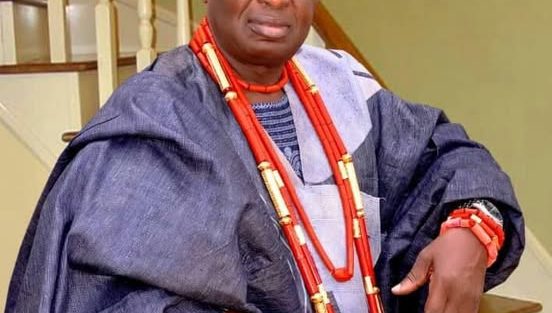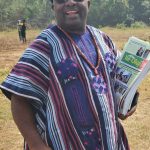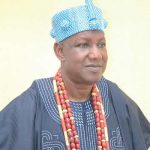High Chief Johnson Akinyele Akinsola Fagbamiye (JP) is a Surveyor, development
consultant, Lisa of Ile-Oluji Kingdom, and second in command to His Royal Majesty,
Oba (Dr) Oluwole Olufaderin Adetimehin, Jimoko II Jegun Olu-Ekun and paramount
ruler of Ile-Oluji Kingdom. In terms of ranking, Jegun is the head of the traditional
rulers, he's the prescribing and consenting authority on Chieftaincy matters of the
kingdom.
After Kabiyesi, we have the next class of traditional rulers, the king makers called
Iwarefa (6 in number). Lisa is the first, followed by Jomu, Odofin, Sama, Odunwo
and the last but not the least is Sasere. The six are members of the Jegun-in-council
and they are also recognized as the King-makers, they also determine, regulates
and implement policies of the kingdom. After the high chiefs are two other classes of
male chiefs, we have the IKULE and the ELEGBE groups of chiefs. The elegbe
chiefs are the warriors that form the military circle of the kingdom in the olden days,
while the Ikule chiefs are those who come close to the high chiefs.
Next to the two groups of chiefs, let me put it this way that Odole Chief is the head of
the elegbe chiefs while Odogun is the head of the Ikule Chiefs. There are five sub-
groups under the Ikule group and five sub-groups under the Elegbe; each group
comes under a high Chief, it's only the Lisa that doesn't have a sub-group. Under
Jomu, Odofin, Sama, Odunwo and Sasere, there are some groups of Ikule chiefs
and also the Elegbe Chiefs. We have the Odole group, Limikan group, Losunla
group and Lodasa group; there are some chiefs constituting each of this groups.
We also have the Opoji female Chiefs headed by Lobun, who also has her own her
own cabinet members, consisting of Lisa-Lobun, Jomu-Lobun, Odofin-Lobun, Sama-
Lobun, Odunwo-Lobun (not referred to as odunwo-Lobun in Ile-Oluji but Supoo)
while the last but not the least is Sasere-Lobun.
Apart from these three groups, the Ikule, Elegbe and Opojis are other groups like the
Alaworo group who are the Indigenous group headed by Akasha and were the ones
met in the land of Oijefon. Among them are the Lumole Chiefs. We also have the
Baales who are under the Olojas because the kingdom is divided into 12 districts;
each district is headed by an Oloja assisted by Baales.
Recently, four of the Olojas were upgraded to the position of Kings (Oba), while
others are hoping for such elevation and upgrade.
What is your assessment of the contribution of the traditional institution to the
development of the community?
A community has to be structured. Ile-Oluji as a case study is well structured with
delegation of duties from the king to the chiefs, As a chief you cannot just pick up a
title and relax. There are some responsibilities attached such as modern time
development, services, security, culture, festivals etc. For example, every 8days
starting from the month of October, we have the Lerin (Parliamentary Assembly) of
the King, high Chiefs and chiefs. It's a democratic system of coming together to
make policies and decisions; we also take the welfare of indigenes and non-
Indigenes paramount.
What is your advice for traditional title holders in the community?
Traditional title holders have duties and responsibilities attached to their titles. As I
said earlier after accepting a title you will be conferred and installed. Then any of the
chiefs can be called upon anytime for a particular task, so we advise anyone who got
a title to be always prepared.
Can you please tell us more about the meaning of your title, its
historical significance, its roles and its place in the community?
By the grace of God, the wish of the people and pleasure of Kabiyesi, I was offered
the title of Lisa and installed. Lisa is the second in Command to the king who attends
to issues if Kabiyesi is not around. Secondly, over the years Lisa has become the
mouthpiece of the community. On many occasions, the King calls on the Lisa for
advice, clarification of issues related to the community and other communities.
Lisa sometimes represents Kabiyesi at the State and national level. At the local
government level, Lisa is a member of the Chieftaincy affairs committee and other
related matters. Ile-Oluji is so unique compared to other communities, even the
neighbouring communities that we speak almost the same language. We are so
different and unique from them; when we talk about culture and mode of dressing,
here is the home of Alaari (Aso ofi) which is the number one traditional attire in
Yoruba land. There are three types of Aso ofi, such as "Aso Eku" (which is the black
one), "Sannyan" (which is the khaki type and the gold one). The last one is "Alaari"
which is the red one; we can also have the mixture of Alaari and any of the other
two. Ile-Oluji is recognised as the home of Alaari because it comes in different forms
and designs for marriages, funerals, naming, and Chieftaincy ceremonies. Our
drums are also different because they are solemn and not the hard type. Our
festivals such as Owe (the yam festival), Ogun (the god of Iron), Balufon (when
Kabiyesi eats new yam).
Is there any need for a reform of the Ile-Oluji traditional institution?
If yes, in which areas, and what would be your suggestions?
From time immemorial, our traditional institution has been consistent, but that does
not mean we cannot make changes to reposition and strengthen it. For instance, the
chieftaincy institution has undergone some silent changes. Hitherto, it was Kabiyesi
that gave titles, but now if you show interest, we will conduct interviews and other
processes will follow. Emphasis is on the capacity and competency of the person.
Also, titles are now conferred during Lerin and Odun Oba. Another change is that we
now have honorary titles for indigenes and non-Indigenes. For example someone
who is a Journalist can be given "Onigegeara", a medical doctor who doesn't have
time "Onisegun Oba" or "Baasegun", legal Practitioner "Baamofin", the president of
the Federal Republic of Nigeria was conferred with "AARE" even before he became
the president.
What should be the relationship between the Jegun-in-Council and the political
class? Some think that politicians and political office holders are not
according the leadership of the community the due respect. Do you share this
view?
As I said earlier, there is a ministry in the political settings which is the ministry of
Chieftaincy affairs and other related matters. We meet to discuss issues concerning
the community and government. Sometimes, the political office holders influence
some infrastructural facilities needed by the community.
A lot has been done by Jegun Adetimehin and the JIC to transform
Ile-Oluji. What are the other areas you are focusing on?
Most of the good things you see in Ile-Oluji are majorly through self-help. Our public
schools were initially established through communal efforts before the government
took over after some years of establishment. Recently, the community constructed
an ultramodern Diagnosis center, and we also ventured into Agriculture, shopping
malls and recently we acquired 30 hectares of land for estate.
Please offer a word of advice for Oijefons at home and Diaspora)
They should all be part of the growth of the kingdom. Whether you are home or in
the Diaspora, jump on the development train, support our development projects.



